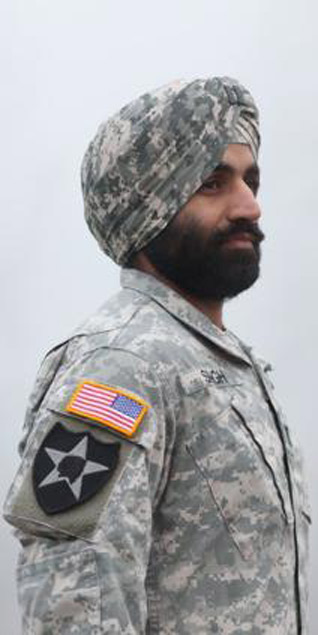Current Events
U S Army Moves Step Closer To Equality For All Citizens:
Capt Simratpal Singh
DAVE PHILIPPS
The U.S. Army has granted a decorated officer, who is a Sikh-American, permission to wear a religious beard and turban in uniform, ending a protracted battle that pitted individual religious freedom rights against what the military said was a need for uniformity and strict safety standards.
Capt. Simratpal Singh, a lifelong Sikh who shaved his beard when admitted to the elite West Point military academy a decade ago, asked the U.S. Army in October to allow him to begin wearing a beard and turban. Facing a discrimination lawsuit, the Army granted him a temporary accommodation in December 2015.
In February 2016, with the temporary accommodation set to expire, the Army told Captain Singh to report for days of gas mask and helmet testing. He sued, saying other soldiers -- even those with beards -- faced no such requirements, and the tests amounted to religious discrimination.
On Thursday, March 31, 2016, the U.S. Army granted a permanent accommodation, saying in a court document that it would only be revoked if the beard and turban affected “unit cohesion and morale, good order and discipline, health and safety.”
“Because of the Army’s strong interest in maintaining good order and discipline, the Army intends to develop clear, uniform standards applicable to soldiers who have received religious accommodation,” Debra S. Wada, the assistant secretary of the Army for manpower and reserve affairs, wrote in a memo to the captain released on Friday. Until those standards are in place, she said, Captain Singh will be expected to appear in a “neat and conservative” manner with a black or camouflage turban.
On Friday, Captain Singh talked about his decision to accept the ban when he entered West Point and his effort to find a way to serve the Army and follow his religion.
Question: You had to shave when you entered West Point 10 years ago. Why were you willing to do that?
Answer: It was a very difficult decision for me. I had to choose between serving my country and my faith. I was 18 years old and I didn’t really know what to do, or who to go to, to try to change things. As terrible as it sounds when I showed up at West Point, I accepted defeat. But I promised myself I would find a way back to my roots while also serving my country. I knew I would figure out a way. See, for me, the Sikh faith is all about justice, tolerance, equality, sticking up for the oppressed -- all the things the U.S. Army also stands for. I’m just glad I could finally fit those two parts of my world together.
Q. The Army now allows you to express your religion in a way that is “neat and conservative.” What does that mean?
A. I can wear a black turban or a camouflage pattern turban with my rank on it. When I wear a helmet, I have a smaller turban that can go underneath and doesn’t affect the fit. My beard can’t be more than two inches. Mine is only about one and an half inches now. But if it is longer, I would have to tie it under. I do that anyway now. I take a rubber band and roll it up and tie it underneath. Then I use a little hair spray to keep it neat and organized.
Q. The Army has argued that letting soldiers be different could undermine discipline and safety standards. You are a captain in an engineering battalion; do you understand their concerns?
A. Based on my experiences, I don’t understand the good order and morale concerns. The response from my unit has been overwhelmingly positive. My fellow soldiers, my command, people I studied with at West Point, they have told me they support what I am doing. I have never had a single negative comment. The people I work with, they just treat me like a regular soldier, which is what I want. In the Army, people care how good you are at your job. Are you a leader? Do you work hard? Then having a turban and a beard doesn’t change anything.
As for safety, I was able to put on a helmet and go qualify at a shooting range with the rest of my unit, no problem. I was able to go through the gas chamber with my unit, too. I don’t see safety concerns. The guy who tested us gave me a tip he learned from Special Forces guys, who also have beards. Just put a little Vaseline on the edges and you get a good seal.
Q. What do you think this decision says about the Army and the direction in which it is moving?
A. Believe me, as turbulent as it has been, I am thankful to the Army and this decision. Throughout the Army’s history, it’s been slow to move but has always moved in the right direction. I think that happened here. It only makes sense that our military would reflect the diversity of our nation. Kids like me used to be told you can be anything you want to be, but you can’t serve your country in uniform. That is no longer the case. I had a Sikh kid reach out to me a couple days ago, he’s interested in joining the R.O.T.C. program and wanted to know more. That was great to hear.
Q. The Army says it will continue to assess whether your beard and turban are disruptive or unsafe, and if so, it will revoke your religious accommodation. What will this mean for you going forward?
A. Ideally it shouldn’t mean anything. I should just be doing my job to the best of my ability and meeting Army performance standards. If that is the case, nothing should change.
[Courtesy: The New York Times. Edited for sikhchic.com]
April 5, 2016



